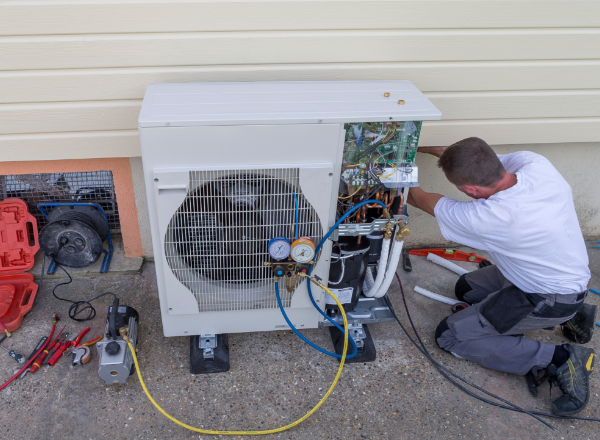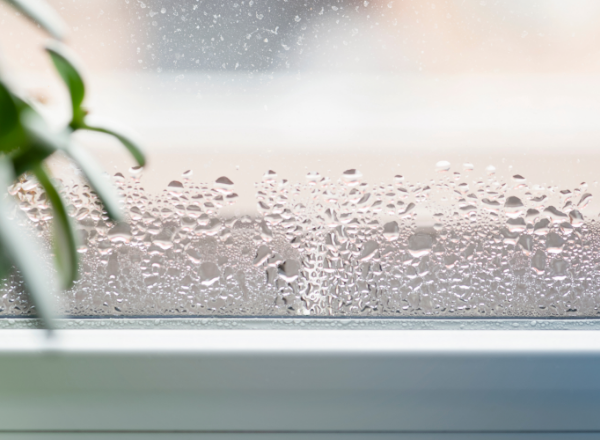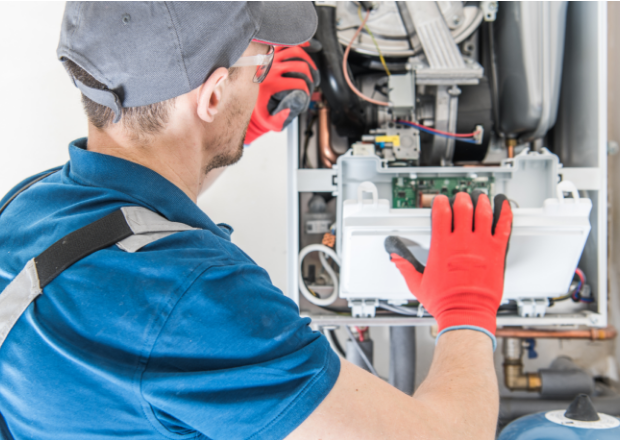For most people, air quality issues evoke thoughts of smokestacks, smog and other outdoor air pollution. In reality, indoor air pollution issues have a much greater impact on homeowners’ health and comfort. Since the average American spends as much as 90% of their time indoors, reducing indoor air pollution helps you breathe easier. At Poston Brothers Heating & Cooling, we work with a number of homeowners and businesses to improve their indoor air quality. This is especially important for family members who experience seasonal allergies, respiratory discomfort or have asthmatic symptoms.
Your home should be an oasis from the elements. While most HVAC systems focus on regulating indoor air temperatures, indoor air quality is often neglected. Pollution has long been promoted as an outdoor issue, but more recently information has become available regarding indoor pollutant levels. According to the Environmental Protection Agency, indoor air inside a home or building can be two to five times more polluted than outdoor air. Improved indoor air quality can have a positive impact on your health and comfort.
Defining Indoor Air Quality
Indoor air quality (IAQ) refers to the presence of airborne particles considered contaminants, relative humidity, ventilation and temperature of the air within a space. Since there is a broad range of elements to consider, Poston Brothers always starts a consultation to test your HVAC system for efficiency. When your air conditioning, furnace and ductwork are working smoothly, we can focus our attention on optimizing humidity levels and reducing particulates from your indoor air.
Why Does Indoor Air Harbor More Pollution than Outdoor Air?
The most simple answer is volume and circulation. Outdoor air flows with the breeze and the weather which dilutes the concentration of many contaminants. Inside your home, there is far less air movement. Even the best ventilation system and most powerful air handler cannot circulate air constantly to disperse irritants at the same rate as outdoors.
Another factor is the quality of construction. Modern homes are designed to be extremely energy efficient. Building codes and other regulations help keep windows sealed, doors secure and attics well insulated. There are major improvements in how homes are heated and cooled. Energy efficiency helps reduce wasted energy but greatly impacts the air quality.
There needs to be a proper air exchange rate met to help get enough outdoor air inside and cycle the air carrying indoor air pollutants outside. Upgrading HVAC equipment improves indoor air quality. New air conditioning systems can filter more outdoor pollutants, and high-efficiency furnaces and air handlers capture more particulates than older models. Still, standard appliances only go so far.
What Are the Main Contributors to Poor Indoor Air Quality Problems?
While outdoor air pollution may infiltrate your home through the ventilation systems, the primary sources of indoor air quality issues are everyday products and activities.
Stoves and Ovens
Cooking contributes significantly to indoor air quality. This is quite surprising until you consider proper ventilation. During cold and hot months, homeowners are less likely to operate the hood. Exhaust from natural gas remains in indoor spaces.
Chemicals and Cleaners
Volatile organic compounds (VOCs) refer to chemicals that are emitted as gasses from certain solids and liquids. They are found in a wide variety of products, including paints, cleaning supplies, pesticides, and building materials such as flooring and furniture. High levels and constant exposure to VOCs can cause various health problems, including eye, nose, and throat irritation, headaches, dizziness, and allergic reactions.
Air fresheners, household cleaners and even personal products can impact the indoor air quality as well. The importance of indoor air quality really comes into play when we discuss exposure. Exposure to indoor air pollution is what puts people at risk for health symptoms and issues. Those of us who are most susceptible to health issues caused by exposure to certain airborne contaminants are more likely to spend an even greater portion of time indoors.
Mold and Biological Contaminants
Mold describes a common fungus that grows in damp or humid environments. It can grow on a variety of surfaces, including walls, ceilings, and floors. Mold can even form inside air ducts and on indoor vents. Mold produces spores, which are tiny, lightweight cells that can travel through the air and be inhaled into the lungs.
Exposure to mold can cause a variety of health problems, including allergic reactions such as sneezing, runny nose, and red or watery eyes. In some cases, mold exposure can also lead to more serious health problems, such as asthma attacks or other respiratory problems. In addition to mold, other common biological contaminants found in homes include bacteria, viruses, and allergens from dust mites, pet dander, and pollen.
When these allergens build up inside a home, they expose allergy and asthma sufferers to more of their triggers so they are more likely to suffer symptoms. Even in healthy people, exposure to high indoor air pollutants can lead to health side effects like runny noses, headaches, fatigue, and more.
Furnaces
Combustion of natural gas and propane creates emissions. A well-maintained furnace that is inspected annually will be tested for carbon monoxide. Cracks in heat exchangers, breaks in gas lines and damaged exhaust flues may result in harmful carbon monoxide buildup. Inspections reduce serious health risks, but there are other side effects. Beyond pollution, furnaces contribute to reducing the relative humidity levels in the air. Winter air is already dry, and combustion results in lower water vapor within your indoor air.
Other sources
There are some more obvious sources of indoor air quality issues including fireplaces, pesticides, radon gas and secondhand smoke. All of these contribute to reducing indoor air quality in some manner. Poston Brothers uses indoor air quality monitors like radon detectors, carbon monoxide detectors and carbon dioxide monitors to protect your family against these serious health risks.
HVAC Systems Improve Indoor Air Quality
Generally, maintenance, inspections and professional repairs will improve indoor air quality. Part of any professional HVAC system inspection is cleaning units, replacing air filters and checking ductwork for signs of leaks and damage. When homeowners form a relationship with a professional HVAC contractor, the maintenance occurs in the spring for air conditioning and again in the fall for furnaces.
Between professional inspections, there are a number of chores every homeowner can do to improve indoor air quality using their central air conditioning systems and furnaces. Regular cleaning reduces dust on surfaces. Often overlooked is frequently cleaning air vents. Check air filters monthly and replace dirty filters. Clean around furnaces and air conditioners to reduce outdoor contaminants.
There are additional services and products that improve poor indoor air quality. Duct cleaning services can help to restore your HVAC system. The greatest impacts are made by adding whole house equipment, including:
Air Cleaners
Air conditioners help to prevent outdoor contaminants from entering your home. Standard air filters also capture around 80% of airborne particles. Air cleaners have much higher MERV ratings, removing as much as 95% of airborne debris, allergens and irritants. Cleaner air reduces dust on surfaces and irritants in the air.
Air Purifiers
Air purifiers treat all the air circulating throughout your HVAC system with ultraviolet light. When viruses and bacteria are isolated within the air purifier, your overall immune health can be improved.
Humidifiers and Dehumidifiers
A major factor that is often ignored in indoor air quality is humidity. Controlling the ideal relative humidity levels in your home is important for reducing the risk of mold and other biological contaminants. Dehumidifiers lower humidity in risky areas like basements during high-humidity seasons.
Proper humidity levels also hold dust and debris within the air. This means that contaminates are captured in air filters and air cleaners instead of resting on surfaces. Dry air is a major irritant during winter weather. We have all experienced dry noses, itchy eyes and scratchy skin related to dry winter air. Improving indoor air quality by balancing humidity levels helps the air feel more comfortable. Humid air feels warmer and more comfortable which means thermostats can be set lower to save energy consumption.
Fight Seasonal Allergies with Good Indoor Air Quality
People who have asthma or suffer from allergies are no strangers to the importance of good indoor air quality. The amount of indoor air quality pollutants found in the air inside your home has a real and noticeable impact on the way they feel.
Seasonal allergies are common in a large portion of the population, especially in the spring. Pollen counts spike this time of year as trees and grasses bloom. Mold spores can exist in high volumes over the spring months, too. Even though these contaminants originate outside, the outdoor air coming indoors can easily increase indoor pollutant levels for people who suffer from these allergies. The pollutants make their way into homes through open doors and windows, on our shoes and clothing, and even on our pets. Once they come inside, poor ventilation keeps them trapped inside, and over time quantities continue to build. This can greatly increase indoor pollutant levels inside the home and can make allergy sufferers feel awful.
Reducing the number of indoor air pollutants and focusing on trying to improve indoor air quality in the home can help lessen your spring allergy symptoms. The right tools can help you remove these particles from the indoor air supply and fill your living spaces with fresh air so your symptoms decrease.
Gain Better Indoor Air Quality Through HVAC Solutions
Your HVAC system and the tools that work with it are key when it comes to the importance of indoor air quality. Improving ventilation by adding mechanical solutions can push out polluted air and fill your home with fresh air throughout the day. Indoor air quality equipment like air cleaners and air purifiers remove particles or neutralize organic contaminants so exposure is reduced.
Poston Brothers Heating & Cooling knows the importance of indoor air quality and how it can impact your health this season. Contact us today to learn more about the installation of indoor air quality equipment that will reduce indoor contaminants for a healthier indoor environment.











